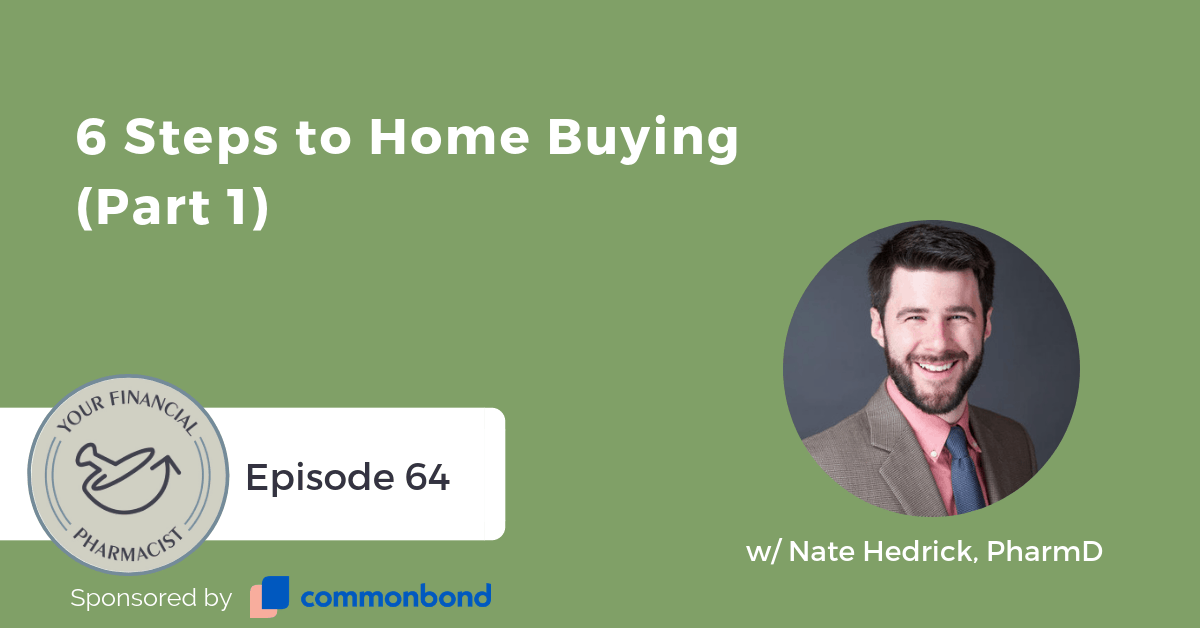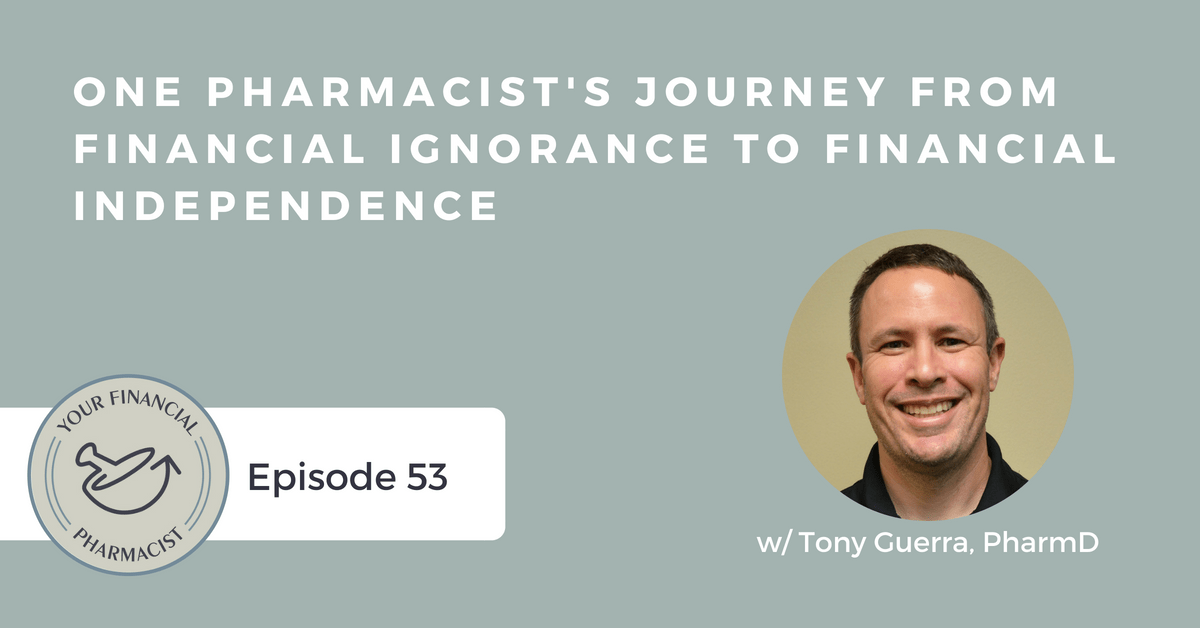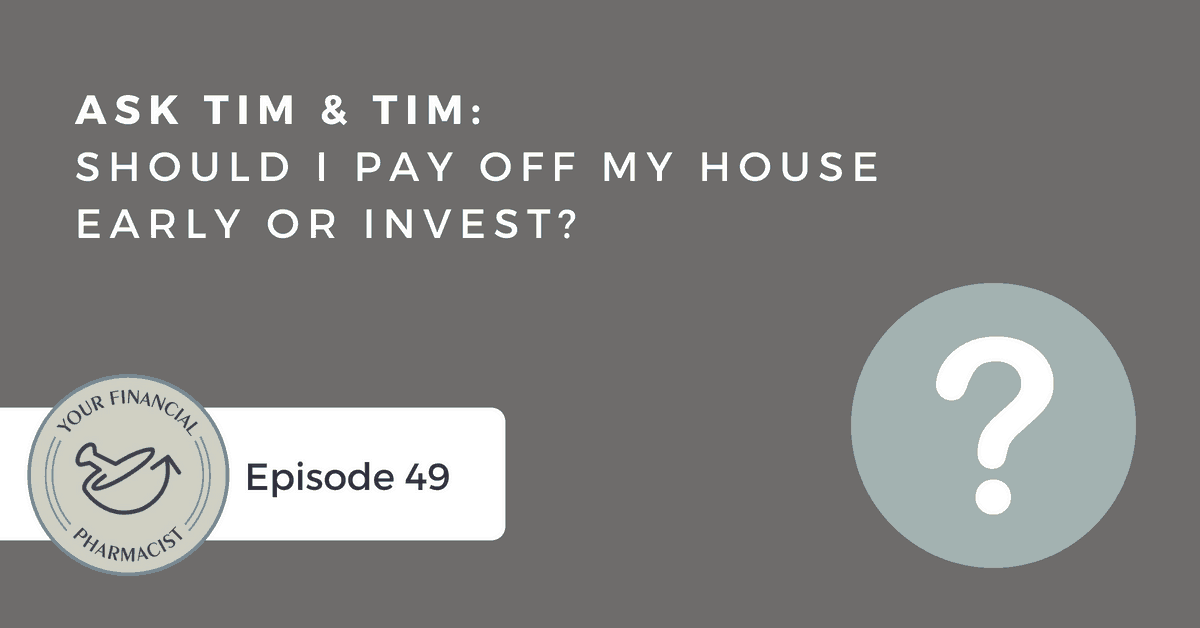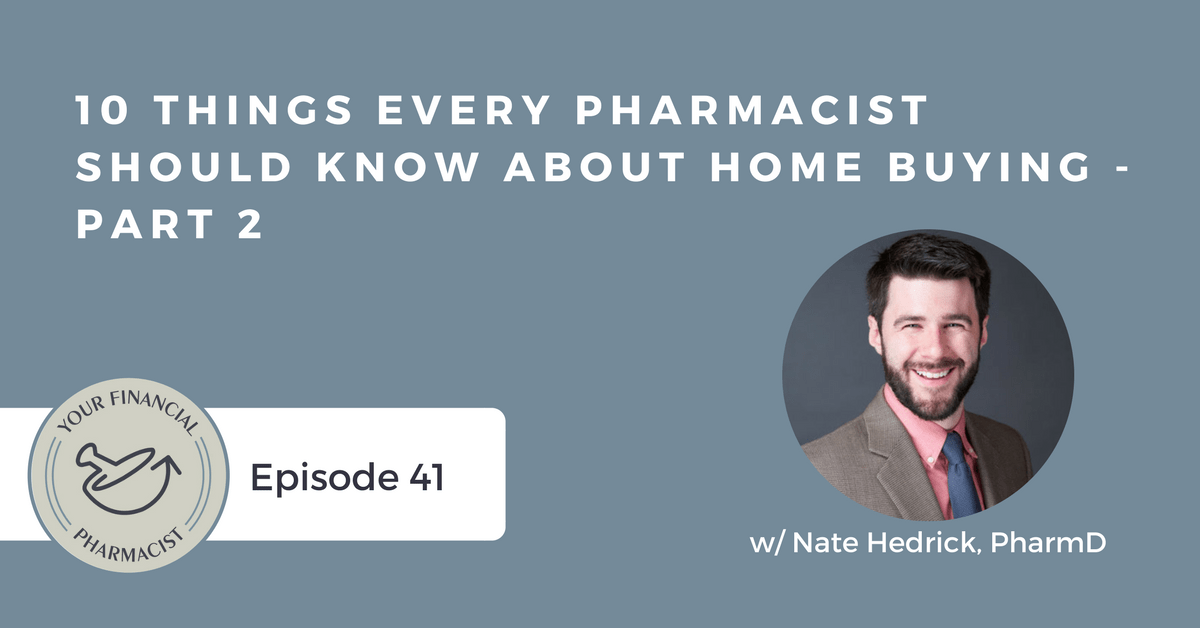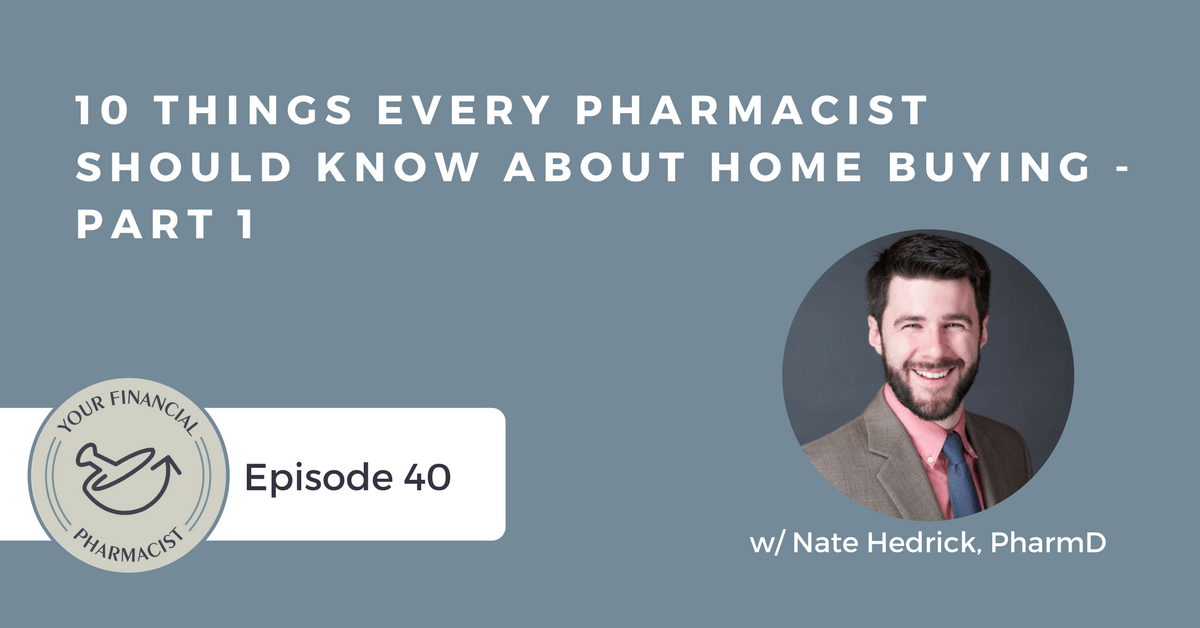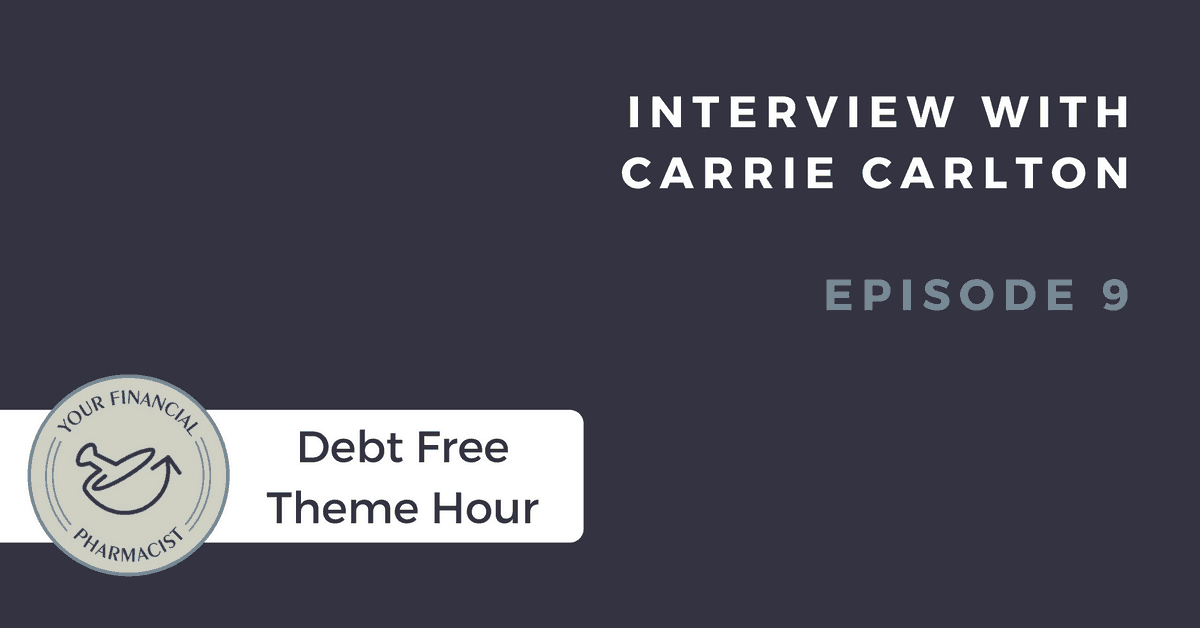6 Steps to Home Buying (Part 1)
On Episode 064 of the Your Financial Pharmacist Podcast, Tim Ulbrich is joined by Nate Hedrick, the Real Estate RPh, as they kick off a two part series covering the 6 steps to home buying every pharmacist should consider during this exciting process.
Summary of Episode
Nate Hedrick, PharmD and licensed real estate agent, talks with Tim Ulbrich about the benefits of home buying for pharmacists and the first three of six steps to take when you are considering buying a home. These steps to home buying are found in the Home Buying Quick Start Guide. They are a great framework to follow whether you are buying your first or fifth home or are just starting to think about the home buying process.
Nate first lays out the benefits of home buying including being able to change the house and property how you wish, being your own landlord, increasing equity, taking advantage of tax credits and breaks that pair with home buying, and several others. Then, Nate and Tim dive into the thick of the episode, discussing the first three steps to home buying.
Step one involves making sure you are ready to buy a home. Knowing your budget, understanding your current debt-to-income ratio, as well as being aware of the additional costs of a mortgage are all important aspects of this first step. Step two urges you to think about what is important in your home search by narrowing down your must-haves. Be sure to think about location, size and space, and flexibility of the home you are looking for before beginning your search.
Step three is all about assembling your team. By bringing in professionals like real estate agents, financial planners, accountants, lawyers, the Your Financial Pharmacist community, and family or friends to be a part of this home buying journey, you will be supported with knowledge and guidance.
Be sure to listen to part two of this series to learn all about last three steps in home buying.
About Today’s Guest
Nate Hedrick is a 2013 graduate of Ohio Northern University. By day, he works from home as a hospice clinical pharmacist for ProCare HospiceCare. By night, he works with pharmacist investors in Cleveland, Ohio – buying, flipping, selling, and renting homes as a licensed real estate agent with Berkshire Hathaway. This experience has led to a new real estate blog that covers everything from first-time home buying to real estate investing. Nate’s blog can be found at www.RealEstateRPH.com
Mentioned on the Show
- Commonbond
- Real Estate RPh
- Homebuying Quick Start Guide
- YFP Episode 040: Ten Things Every Pharmacist Should Know About Home Buying Part 1
- YFP Episode 041: Ten Things Every Pharmacist Should Know About Home Buying Part 2
- Zillow
- Realtor.com
- Contact Nate Hedrick, Real Estate RPH
Episode Transcript
Tim Ulbrich: Nate, welcome back to the Your Financial Pharmacist podcast. How you been?
Nate Hedrick: Good, Tim. Thanks for having me.
Tim Ulbrich: So we’re excited not only to be doing this month-long series focused on home buying but also this two-part series outlining steps that pharmacists should take in the home buying process. And the good news is there’s no need to take notes. So Nate along with the team at YFP has worked hard on developing the first-time home buying quick start guide. You can get access to that at YourFinancialPharmacist.com/homeguide. Again, that’s YourFinancialPharmacist.com/homeguide. So Nate, it wasn’t too long ago, episodes 040 and 041, we had you on to talk about 10 Things Every Pharmacist Should Know about Home Buying, so are you ready to dig a little bit deeper here on this topic?
Nate Hedrick: Definitely, let’s get into it.
Tim Ulbrich: Awesome. And I’m excited also just to introduce Nate in a more formal role to the YFP community. I know, again, we had you on episodes 040 and 041, but we’re really excited about this partnership between YFP and the Real Estate RPH. We’ve got some awesome content coming to the YFP community. And we’re excited to leverage your expertise and bring you to the YFP community. So to our listeners, stay tuned. You’re going to see a lot more and hear a lot more on real estate from Nate Hedrick, the Real Estate RPH. So Nate, we’re excited to be on this journey together.
Nate Hedrick: Yeah, I’m really excited. I think it’s the perfect marrying of our two kind of entities. It’s going to be a great opportunity.
Tim Ulbrich: Absolutely. Alright, let’s jump in. Six steps, as you think about six steps for the home buying process. And I think before, Nate, we jump in to these six steps, I think let’s just start with kind of a high-level discussion of the benefits of owning a home. So for those that are listening that maybe are renting now or thinking about buying in the future, as you’re working with clients or potential clients, what are some of the things that you’re thinking of as benefits of owning a home to begin with?
Nate Hedrick: Yeah, definitely. I really write these down into the financial benefits and then I would call them the emotional benefits, if nothing else. The financial benefits are things like the equity that you’re able to build. You know, if your home goes up in value — and in general, the home market is going up in value. Obviously, we’ve got scenarios where it may not do as well, but generally, your home’s going to go up in value. You’re building equity in that home, your home is going to be worth more down the road. So it’s almost like an investment, makes for a great investment in your future. And then there’s also things like tax breaks. You can write off your mortgage interest and there are tax credits for first-time home buyers. You can deduct loan points, right, when you go and buy your first home. Energy credits, all that stuff. So there’s financial pieces that a lot of people benefit from, and then there’s also, like I said, the emotional side. You know, you’re the landlord now. You don’t have to answer to anybody. You can tear down a wall or put in a garden. It’s all kind of up to you. And there’s no maintenance department you have to call to make sure it’s OK and all that. So I think you have to key in on what’s the most important part to you. But you’ve got all these different aspects that make home buying really something to look forward to.
Tim Ulbrich: I’m glad you broke that down to the financial and the emotional because I think often when I’m talking with community members, I hear kind of that comparison just dollar-wise of renting and buying. And there’s a lot to consider there, of course. But you also have to consider some of those emotional aspects, as you mentioned. And you know, one of the great things of owning a home is just having a place to call your own. You mentioned being a landlord but also that sense of community that you can develop in your neighborhood and having that sense of stability of a place that you can come home each and every day. So as we jump into these six steps — and we’re going to cover three of them on this first part in Episode 064 and then we’ll cover three more in Episode 065. So Step No. 1, Nate, is making sure that you’re ready. Obviously incredibly important as I think this is a step that people jump over, jump past. They’re excited about getting a home, and buying a home, as you just outlined, can be a great move. But you have to be in the right position. So as you’re talking to a pharmacist, and you’re talking to them around this concept of making sure they’re ready, how does somebody know if they’re ready or not?
Nate Hedrick: Yeah. And just like the benefits, there’s an emotional side and there’s also a financial side that you really need to be able to weigh in on. Financially, I think because this is Your Financial Pharmaicst, that’s kind of the bigger focus here. But, well, we’ll touch on both. So the very first thing you want to look at is your budget and understanding your budget. It’s really easy to get out of school or be out of school for a couple of years, you’re making this great salary, and we’ve talked about this on the podcast before, but it’s easy to go to that bank and they say, ‘Oh yeah, you’re approved for a $700,000 home based on your income and your debt.’ But you have to know what your budget is. And there are 10 different ways you can calculate your appropriate housing budget, but you first need to know what that number’s going to look like because if you’re not able to wrap your head around that new payment that you’re going to be having every single month and all the aspects that go with it, you might run into some trouble down the line.
Tim Ulbrich: Yeah, absolutely. So knowing your budget, you mentioned there’s lots of different ways to get there. Are there general rules of thumb or things that you’re advising people to say, ‘Hey, this is roughly what you should be considering’ because we know, of course, the bank will help you set a budget, but ideally, as we’ve talked about before on this podcast, you as the lendee are better off to set your own budget than the bank is. So what are some general rules of thumb? What should people be looking for?
Nate Hedrick: Yeah, I’ll tell you what I use because it’s worked for me for years, and it’s a really simple but effective way to kind of get the raw numbers. So I use what’s called a 50-30-20 rule. And 50% of your budget of your take-home budget — that’s important, not your gross but your take-home budget — should go to your needs, things like food, clothing, shelter, everything that you absolutely need day-to-day. 30% of your budget, 50-30-20, the 30% should go to your basically your wants, excess stuff, so things like going out, entertainment, paying off loans faster, all those things that aren’t absolutely necessary but are important in having a comfortable life. And then the last 20% should be really your savings. Again, this is take-home pay. So 20% of that should be going into your savings or some sort of, again, you could throw a little bit more of this at paying off your loans or bumping up your retirement, something that is going to basically increase your net worth with that last 20%. So if you break those numbers down and we just look at the 50% for your needs, housing fits right into that. And so if you already know your food costs, and you know your clothing costs and all that other stuff that goes along with your needs, you can figure out how much is left over for a housing budget. And use that number with a couple of online calculators to easily get to a final housing number and what you can probably afford in a monthly payment. And that’s just one option. There are a lot more, but that’s one that’s worked for me because of its simplicity.
Tim Ulbrich: Yeah, I think that’s a good general rule of thumb. Obviously, this is going to be highly individual, right? So we know that people that, somebody that has $300,000 of student loan debt and credit card debt versus somebody that has no or a little debt, or of course cost of living can vary significantly from one area to another. I like your guidance there. The rule of thumb that I’ve heard before that I’ve used, and Jess and I are actually working through this right now as we’re on the home buying process down in the Columbus area, is no more than 25% of your take-home pay in terms of principal, interest, taxes and insurance. And obviously, again, in some areas, it’s more feasible or reasonable than others. But I think the point that we’re trying to get here is avoiding this idea of becoming house-poor and ensuring that your financial house is in order before you add on what arguably would be the largest payment and the largest purchase that you’ll ever make. So what will the bank give you? What are the rules of thumb that a bank’s giving you? Because I will say, going through this process in 2008 when my wife and I bought our first home — no, excuse me, 2009 — versus 2018 now, it seems like in 2009, we were put through the ringer. And it seems like now in 2018, it’s pretty much like, hey, whatever you want, we’re willing to give you. So what are the numbers, if there are any anymore, that banks are using?
Nate Hedrick: Yeah, it’s definitely getting a little lenient, which is a little bit scary, I’ll be honest. But the big numbers that you want to recognize is really what’s called your debt-to-income ratio. And no matter what type of loan you’re going to be getting, the conventional, FHA, VA, private, any of those, one of the biggest things they’re going to look at is your debt-to-income ratio, which is exactly like it sounds. How much debt are you carrying right now? What are you paying every single month toward your debts? And then what are you bringing in every month? And how do those compare? To give you some perspective on what they’re looking at, a bank for a conventional loan will use what’s called the 28-36 percent rule, 28-36 rule. And what they’re looking for here is that if 36% of your annual gross income, no more than that can go to your housing debt. So if you already have a significant amount of debt that’s taking up a lot of your income, basically that housing allowance can’t push that number over 36% because otherwise, they won’t be able to lend to you. So they do put some hard stops in place, and you can extend those hard stops with different types of loans, FHA pushes those numbers a little bit higher. VA has different limits. But there are some hard stops where they will say either your income is too low or your debt is too high, and you cannot take out this loan, basically.
Tim Ulbrich: Yeah, and I think the take-home point being here that you’ve got to obviously have a good budget in place already. You mentioned one method of doing that. We’ve had previous posts and podcast episodes talking about the zero-based budget, which we highly recommend on behalf of the team of YFP. I think, too, it’s worth, Nate, here thinking about the future on some level. So as you think about your month-to-month expenses now, what might, if anything, change in the future? So family situation, job changes that may come down the road, are there home repairs or other things, get an idea of what other portion of your monthly income might change as you move into the future and how that might impact what you’re ready to buy. And I think living this in-the-moment, right now, I cannot emphasize enough setting your own budget versus letting the bank set it for you. I know if Jess and I would not have done that, what we got back from the bank basically for the pre-approval was double what we had said was the high end of what we wanted to purchase. And so the bank doesn’t necessarily know exactly all the financial goals that you’re trying to achieve and other things that you’re working on, so making sure you’re setting that budget yourself before you go into this process. So what are the costs that our listeners should be thinking about associated with a mortgage? Of course you’ve got a down payment, so talk us through that. And then on a conventional loan, what that means, maybe, versus some other loans. And then other costs that individuals should be thinking about when it comes to the home buying process.
Nate Hedrick: Yeah, the biggest thing that you should keep in mind are, first of all, the costs that you’re going to have to basically take on up front. And this is basically before you move in, what kind of cash you’re going to need in-hand because obviously, you’re going to have the loan payment, and you’re going to have those monthly payments, but you’re also going to be making monthly income. So those are manageable, and you can easily budget for that. But we still need to go to the table with quite a bit of money in hand. So the first, like you said, is down payment and having that ability to basically secure the loan with a significant amount of cash. And that can be anywhere from as low, there are some that are 0 down, 3.5% down, all the way up to 20% down for a more conventional, traditional mortgage. But you have to have that money in hand or if you’re going to get that from a family member, you have to have basically a letter indicating where that down payment is coming from and so on. But that’s probably the biggest chunk you have to account for. And it’s the one that most people know. But what you often overlook is things like earnest money and closing costs. And earnest money is basically what you bring to the table to the seller that proves that you’re a legitimate offer. It’s basically money that’s held in escrow that if you back out on the deal for something that’s not due cause, you just say, ‘You know what, never mind. I don’t want this house.’ They actually get to keep that earnest money, generally anywhere from $500-2,000. It’s basically something that can prove that you’re serious. And then they get to keep that if you back out for any kind of unforeseeable reason. And again, the other thing I mentioned is closing costs. So anywhere from 2-4% of your total loan amount is going to be charged to you by the bank in closing costs. These are things like your loan application fee, your appraisal fee, the title loan search fee, there’s all these little things that the bank tacks on, and a lot of them are negotiable. But these are things the bank is going to tack on that, again, you’re going to have to have in some capacity at the time that the deal goes through. Now, closing costs is one of those things where it’s a little bit more negotiable because you can actually have the seller cover all or some of your closing costs. But regardless, you should have that money in hand because if you can’t get that into the deal, you don’t want the deal to fall through because you couldn’t come up with the extra couple thousand dollars you needed for closing costs.
Tim Ulbrich: Yeah, and it seems like the list of those closing costs go on and on, and it’s this fee, that fee, like you mentioned. And we outline these in the guide as well. But I think too, in terms of those being negotiable — and I don’t know your experience as the realtor — what I’ve been experiencing as the buyer in what is a seller’s market is that it seems hard to get those items to be paid for by the seller in this type of a market. But I’m sure obviously, that can vary by region and vary by the type of market and what’s going on.
Nate Hedrick: It definitely varies. And it comes a lot to how long has the house been on the market? You know, if you’re coming in with a couple thousand off, and the house has only been on the market for five days, there’s very little change that they’re going to be assisting you with closing costs. They’re just going to wait for another offer to come. So it totally depends on where you’re looking.
Tim Ulbrich: So Nate, regarding the down payment, I’m guessing some of our listeners are wondering — and we’ll come and talk a little bit later in this episode about the different types of loans that are out there as well — but there are loans, as you mentioned, that you can get out there as low as 0% down or a 3.5% down in an FHA situation. So why would somebody consider 20% and a conventional loan? What are the benefits of doing that?
Nate Hedrick: Yeah, there are two big benefits to the 20% down. For a conventional loan, it basically removes what’s called Private Mortgage Insurance. Now again, as you said, things are getting a little bit more lax. I actually had an offer come into me a couple weeks ago for a house that I was selling, and they managed to find a loan from a very reputable, very large banking organization. It was 10% down with no PMI at all. So it’s not unheard of. I think the 20% down loan requirements are going to start going away. But the requirements going away doesn’t mean that you shouldn’t have the 20% down. And I’ll explain what that means. If you put that 20% down, your mortgage payment obviously is going to go down considerably. You’re going to have a lot more equity kind of built into your home to begin with. If you go at that house with a 3.5% or a 0% down, and something goes wrong or your budget is really tight as it is, that very high payment is all of a sudden going to be much more of a problem. So if you’re able to save that money and put that money down initially, you’re going to have a lot more equity built into the home to begin with and that payment is going to be just that much more comfortable because it’s going to fit that much more easily into your budget if you’ve planned for it like that in advance.
Tim Ulbrich: Yeah, and I think that’s really critically important because I’m sure a lot of people are hearing that number and thinking, my goodness, I want to buy a $300,000 or $400,000 house, so now we’re talking about $60,000 or $80,000 cash in hand, and I think to your point, obviously — and I’m speaking here from a personal mistake I made on my first home of not having that equity in the home. You know, obviously if the market switches, something happens, maybe you want to pick up and move in two years because of a job change and the cost of moving overrides any equity that you really have or built in the home. So I think it gives you not only a lower monthly payment, it obviously gives you a better interest rate on these loans but also because of that built-in equity, it allows you, gives you some more options in the event that some of those unforeseen things happen — the market changes, you have to move, whatever may happen over time. The other thing I think it does — and maybe this is theory and not proven fact, Nate, you can tell me — but what I think it does is I am now in the buying process. If I hold true to that 20%, it kind of forces me down on what I’m willing to buy. So if I didn’t have to put anything down, I think it’s much easier for me to sign the papers on a $400,000 or $500,000 house. But if I stay true to that 20% down, and now I look at that and say, ‘Wow, that $400,000 house, I’ve got to put $80,000 in cash on the table.’ You know, I think that really helps bring down our expectations. And that’s been the experience for Jess and I and I think also helps people get in a better financial position when they’re ready to buy, even though it obviously will take longer to get to that point of building that down payment.
Nate Hedrick: I completely agree. I think it’s something that it’s a rate-limiting step for you. If you can save that 20% down, you’re going to really set yourself up for success rather than trying to stretch everything and going for that 10% down and then pushing your mortgage payment limit anyway. Yeah, I agree. It’s going to set you up for a lot better chance of success.
Tim Ulbrich: And so I think there’s a reason why we started this episode with the benefits of home ownership, right? Because we’re talking now about costs, and we heard 20% down, you mentioned 2-4% closing costs, and people are like, oh my goodness, why am I going to buy a home? Right? And what we haven’t talked about are taxes and insurance and maintenance and utilities. And so these are the ones that I think you can really make some headway or at least be aware of. And I know what Jess and I experienced as we’re buying in Columbus is that depending on the area, you know, you can, we have some homes we’re looking at that property tax is between $4,000-5,000 and other areas that were upwards of $8,000 or more. And so obviously, what that means on a monthly basis is significant. So talk to us about taxes, insurance, maintenance and utilities. What should we be thinking about there?
Nate Hedrick: Yeah, definitely. And I can tell you, it’s funny that you mention that because my investor clients, the ones that are really savvy and really know the markets and really understand the rate-limiting steps of house buyings, one of the first questions they always ask me about a property is what were the yearly taxes on that? Because again, that’s kind of that hidden cost that 1, you don’t really expect and you don’t really plan for if you’re not paying attention, and 2, it can actually go up. So your mortgage payment isn’t really going to change, you know? You’ve set it up, it’s a 30-year loan, it’s a fixed rate or whatever. And it stays the same. But your property taxes, those can easily go up. And if a value of a home is reassessed, then all of a sudden, you’re paying more on it every month. So it’s definitely one of those easy-to-miss kind of hidden costs that I think a lot of people ignore and really need to pay attention to. So it’s really simple. You can actually look up your tax rate for any given property. If you’re on Zillow or Realtor or you’ve got a real estate agent like myself, they can actually look up exactly what they paid last year. It’s all public record to see what the property taxes are. And then you can just break that down into what’s this going to cost me every month or every year? The important things to kind of keep in the back of your head is that a lot of times, banks want that money for taxes, especially taxes, but also insurance to be paid in escrow. What that means is that you’ll pay the amount and a little bit extra into a fund that the bank is going to basically hold onto and twice a year, they will pay out to the county or the city or whoever, they’ll pay out your tax payments. But they get to hold your money, and again, it’s usually a little bit of extra. I think my escrow, they have like $2,000 of mine that I want back, and they —
Tim Ulbrich: Ugh.
Nate Hedrick: I know, it’s awful. This is my poor negotiation skills when I bought my first house. But they’re going to hold onto that, and they’re going to use it as basically an overage to make sure that I don’t mix my tax payments.
Tim Ulbrich: Yep.
Nate Hedrick: So one of the biggest things I recommend to my clients is that you negotiate that, try to get on the plan where you’re paying the taxes directly, not the bank, because they’ll try to swindle you a little bit and hold onto extra money. So all important things to keep in mind.
Tim Ulbrich: Yeah, so you’ve got your property taxes, you’ve got obviously your homeowners insurance that they’re going to require at the point of finalizing your lending. And then I think a portion that a lot of people don’t think about is local income tax that may or may not be there as well. I know I experienced this living in a township, I don’t have it, but potentially going to other areas where you do. And that could be 1-2%, depending on the area. So again, these are the small things but the things that matter because when we talk about the difference of $100, $200, $300, $400, when it comes to either paying taxes or getting a better deal on an insurance policy or having or not having local income tax, for those that have been listening to the podcast for some time, you know that that money, if used elsewhere, paying down debt, investing for the future, etc. certainly can have a monumental effect over time. So you want to be in the details, not only looking at the sticker price of the home, which is I think where most people stop. And often, even if you go into a mortgage calculator, making sure you’re looking at the whole picture and looking at taxes and insurance and obviously, the last piece we have here is maintenance and utilities. And I think a best practice that I learned from others and I’ve heard you talk about before too is just getting an accurate record of what that seller, what the owner of the property has been paying in the maintenance and utilities so you can plan accordingly and making sure it fits in your monthly budget along the way.
Nate Hedrick: And many sellers will provide that to you if you ask. I’ve not had too many issues in the past with people not being upfront. They’ll say, ‘Yeah, this is what I paid last month for sewer, water, trash, electric and gas.’ And that way, you can get a really good estimate of what you might be into once you got into that home.
Tim Ulbrich: OK. So that’s step No. 1, making sure that you’re ready — so again, you defining the plan and the budget, not letting the bank do that for you. No. 2 is determining what’s important. So before you start the home search — because we all know how that goes, right, Nate? You start the search and all of a sudden, you go down the rabbit hole and all of a sudden, you’re signing a contract. You’re like, what just happened? So before you start the search, really narrowing down what you want, your must-haves in a few key areas. So what should people be thinking about here in terms of determining what’s important?
Nate Hedrick: Yeah. This is a really good exercise, I think, for everyone to kind of take away and do before you start that Zillow or that Realtor.com search because if you can define some of these parameters, it’s kind of like hunting for a car, right? I don’t go in and just say, I want a car. I ultimately decide, OK, I need a vehicle that’s going to fit three rows, it fits seven people. Or I need a vehicle that’s going to be really fuel-efficient or whatever. You’re defining something to begin with before you start the hunt for that vehicle. You have a general purpose in mind. This is no different. You know, you want to kind of figure out location as a big key factor. Are you moving for work? Or are you working from home and can move anywhere? You know, do you have to worry about where your kids are going to go to school? Or if you’re going to have kids down the road? You know, all those things can buy into location. But it’s one of those very first, narrow-down steps that you should be taking. So first, looking at location. The next thing you want to look at is probably size and space. You know, how much space are you going to need for you and your family if you have one? You know, do you need three bedrooms or do you need five? Is one bathroom going to be enough? Or do you need multiple? How important is an outdoor space? Or are you living in the city? You know, all those little things about size and space can really help narrow down your search as well. And then the last thing I’d have you look at is flexibility. And flexibility is how dynamic do I need this home to be? Do I need the room to grow into it? Or have I already got my family established, and I know how many bedrooms I need and so on. Or am I only planning on staying here for a couple of years and then I want to rent it out? A lot of people that I know utilize house hacking, which I’ve talked about in the past. And their plan is basically, live there for a year and then move out and rent it out. So making sure that that house is going to be an appropriate rental property as well. So all those little pieces I think will help really narrow down your search so that you’re not just swimming in this sea of available homes. You’ve got a targeted focus as, OK, we’re looking for things that need these given parameters in this given location, and you can jump off from there.
Tim Ulbrich: Yeah, that’s really great advice. And I would even add on top of that trying to prioritize some of these things because I think the home search creep is such a real thing. And I think the danger — and Jess and I felt this in real-time — is when the market is so hot like it is right now, if you don’t go in with a rock-solid idea of what you want and you’re getting pressure from a realtor that hey, we need to make an offer on this, it’s moving, it’s above asking, whatever, and you don’t hold true to those things, all of a sudden you look up and 24-48 hours later, you have a home and you’re like, wait a minute. What happened? Did we veer off from where we initially started, what we wanted? And you know this from looking at homes, maybe you have yourself set on something, like we really need a fourth bedroom or we really need a home office space or we really need whatever, but then you walk in and they’ve got the beautiful cabinets and the countertops and all of a sudden, you’re like, wait a minute. Like it doesn’t have the bedroom that we needed or the home office or whatever. So I think making the list and prioritizing it. We’ve got a set of questions you can consider in the home buying quick start guide, again, at YourFinancialPharmacist.com/homeguide. So check that out, and that will help you here in step No. 2, determining what’s important. So step No. 3, wrapping up this first part of this two-part series, is about assembling your team. And I really like this one because I think often we think you’re going to work with a real estate agent, which obviously is key. But you stop there, and really the right team and having that team in place before you get started can really make sure you stay on track in terms of what you’re looking, it aligns with your goals, but also in having a competitive offer and a plan. So talk to us about assembling this team throughout the home buying process.
Nate Hedrick: Yeah, definitely. And everybody’s team is going to look a little bit different. And I think some people when I talk to them about, OK, what’s your team look like for this? That can sound overwhelming, like oh gosh, I didn’t hire an accountant yet. You don’t need all of these pieces, but these are all pieces that might be part of your team if it’s appropriate. The very first and I think the very most important piece is going to be a real estate professional. You can definitely negotiate and navigate the real estate world without one, but in general, especially for home buying, it’s really nice to have someone that’s an expert about the documents and the markets and just how to work through everything. And ultimately, if you’re buying a home, the real estate agent is free. All of the proceeds for that real estate professional in terms of getting them paid comes from the selling side of things. So it’s really to your best interests if you’re going to be buying a home to have a real estate professional in your corner, someone that understands your priorities but also knows how to make that a realistic possibility based on the market and what’s available to them. So if there’s nothing else that you add to your team, a real estate professional has got to be, I think, one of the top ones. I’m probably biased as a real estate agent myself, but I think that’s really key. And I’ve seen some people make some mistakes basically not by having one. So that’s first and foremost. From there, again, it’s going to matter based on your individual situation. Things like a financial planner can be really beneficial, helping you identify, you know, OK, what does our budget actually look like? I design my budget, but does that actually make sense based on my financial future and everything else I need to allocate for? Some states require an attorney. In fact, many states require an attorney be part of a real estate transaction, so you may need to have one of those as well. If you don’t know an attorney or don’t know where to look, ask your real estate agent. Again, that’s why that’s the first step because they’re going to be able to direct you to somebody that’s good with real estate law. Again, you might need an accountant. That might go hand-in-hand with your financial planner, somebody that’s going to help you with not only determining maybe things like your budget or your allocations, but more importantly, helping you get those tax breaks we talked about earlier. A good accountant is going to be able to identify every little piece that you can claim, all the little nuances in the very extensive tax code that you should be indicating when you’re finally filing your taxes at the end of the year. So having that accountant can be really beneficial. And then really the last component, the last two components, is going to be just people to help you out. And that’s like your spouse or your brother or your mom. Whoever you’ve got in your court that’s going to be that extra piece to help you out. And the YFP community, it can be part of that as well. Just people that are going to be unrelated to the transaction but still have your best interests in mind. I think that’s really important to bring with you because, you know, my wife and I ran into this years ago. We looked at a house, and we fell in love with it. And it was this Frank Lloyd Wright-style, gorgeous property on like 15 acres. And we had absolutely no business buying this place. It was totally run-down, but we just, we zonked in on it. We wanted it so bad. And we brought our family through for the second walk-through, and they’re like, what are you guys doing? And we finally kind of shook out of it. And not having them there, we probably would have made a lot of mistakes, so it was really nice to have those — again, they’re not going to be a part of the transaction, but they still have your best interests in mind.
Tim Ulbrich: Yeah, I think accountability is key here, whether it’s a financial planner or, you know, if not, making sure if you have family or friends in the process, making sure they’re not just enabling the emotional component here but really checking you to say, ‘Hey, remember you said these things were important?’ And the story that you just gave there, too often we’re in left field, looking at something else. So there you have it, we got the first three steps of six that we’re going to cover. So we talked about making sure you’re ready, setting an appropriate budget, prioritizing this in the context of other financial goals, determining what’s important. We talked about location, size and space, and flexibility and assembling your team to be involved in the real estate buying process. So again, you can get access to all this information and more detail, these three steps as well as the other three that we’ll cover on the next episode of the podcast. You can download that, again, for free on YourFinancialPharmacist.com/homeguide. So Nate, I’m guessing we have some listeners that are thinking, OK, I’m going to be buying, maybe I am buying, I’m selling, I really would love to talk to a real estate agent that is a pharmacist. So how can people get in touch with you? What’s the best next step that they can take?
Nate Hedrick: Yeah, definitely. And you know, getting in touch with somebody and having someone to ask questions to can be a really big benefit. So we, again, as part of our partnership, you can actually go to YourFinancialPharmacist.com/realestaterph, and there’s a great contact form there you can fill out. It’s just some basic information about yourself, and that will kick right to me. And if you’re interested in having a discussion or need a real estate agent or really just want to ask some questions, I would love to be that resource for you guys.
Tim Ulbrich: Awesome. Again, that’s YourFinancialPharmacist.com/realestaterph. And so as we wrap up another episode of the podcast, I want to take a moment to again thank our sponsor of today’s show, Common Bond.
Sponsor: Common Bond’s on a mission to provide more transparent, simple, and affordable way to manage higher education expenses. Their approach is no big secret. Lower rates, simpler options, and a world-class experience, all built to support you throughout your student loan journey. Since its founding, Common Bond has funded over $2 billion, with a b, in student loans and is the only student loan company to operate a true one-for-one social promise. For every loan Common Bond funds, they also fund the education of a child in the developing world through its partnership with Pencils of Promise. Right now, as a member of the YFP community, you can get a $500 cash bonus when you refinance through the link YourFinancialPharmacist.com/commonbond. Again, that’s YourFinancialPharmacist.com/commonbond. Nate, thank you so much for joining and looking forward to next week where we’ll tackle the last three steps of these six steps of the home buying process.
Nate Hedrick: Yeah, thanks so much for having me.
Join the YFP Community!
Recent Posts
[pt_view id=”f651872qnv”]

